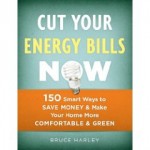 The Home Energy Diet: How to Save Money by Making Your House Energy Smart by Paul Scheckel
The Home Energy Diet: How to Save Money by Making Your House Energy Smart by Paul Scheckel
Paul Scheckel wrote The Home Energy Diet and he is obviously a firm believer in what he is talking about. He drives a car powered by vegetable oil and lives in a solar-powered home among other things. His book contains some really great information on how to make your home more energy efficient. The book includes all kinds of graphs and charts to explain energy consumption and he provides explanations that are easy to understand.
Paul provides great tips on using the appliances around your home to maximize energy efficiency. He answers frequently asked questions such as whether it’s more energy efficient to wash your dishes by hand or use a dishwasher. According to the book, a study was conducted at a university in Germany. Volunteers washing dirty dishes in a sink used an average of 27 gallons of water and 2.5kWh of water-heating energy to wash a 12-place dinner setting. A dishwasher handling the same number of dirty dishes used only 4 gallons of water and about 1.5kWh of electrical energy. After all the dishes were washed, about half of the dishes washed by the volunteers were still dirty whereas the dishes that were washed in the dishwasher were clean.
For more interesting facts about energy efficiency around your home, check out The Home Energy Diet and do your part in making your home power smart.

 The Soul of Money: Transforming Your Relationship With Money And Life by Lynne Twist
The Soul of Money: Transforming Your Relationship With Money And Life by Lynne Twist Cut Your Energy Bills Now: : 150 Smart Ways to Save Money and Make Your Home More Comfortable and Green by Bruce Harley
Cut Your Energy Bills Now: : 150 Smart Ways to Save Money and Make Your Home More Comfortable and Green by Bruce Harley The Millionaire Next Door by Thomas J. Stanley and William D. Danko
The Millionaire Next Door by Thomas J. Stanley and William D. Danko Grow Your Money; 101 Easy Tips To Plan, Save, And Invest
Grow Your Money; 101 Easy Tips To Plan, Save, And Invest